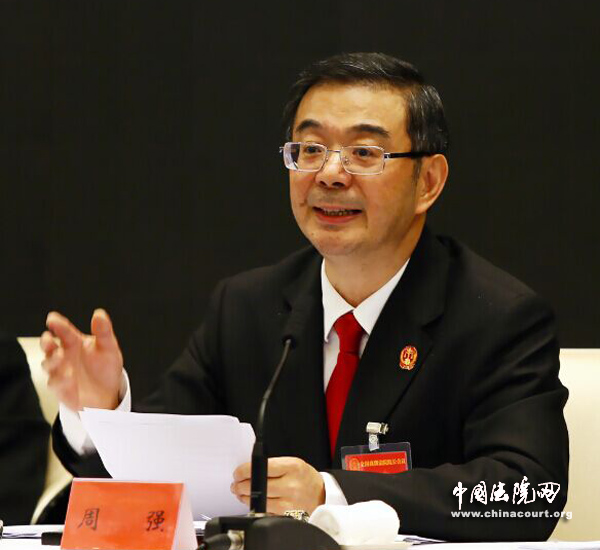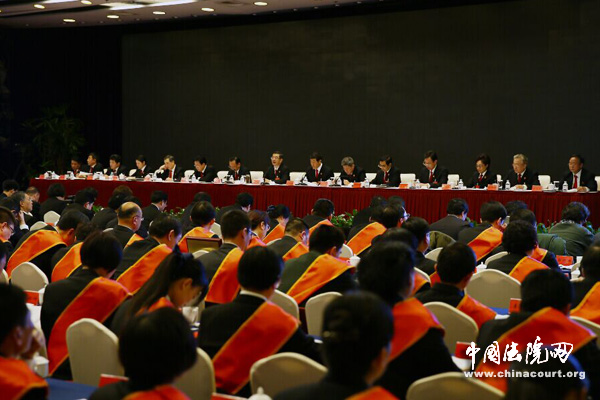Presidents of high people’s courts meet in Beijing to discuss judicial plans

Zhou Qiang, president of the Supreme People’s Court, China’s top court, addresses a national meeting of presidents of higher people’s courts on January 23 in Beijing. [Photo/Sun Ruofeng]

Presidents of higher people’s courts attend a national meeting in Beijing, January 23. [Photo/Sun Ruofeng]
Chinese courts should adjust themselves to new changes in the world as well as China’s economic new normal, further deepen judicial reform and push ahead with informatization to improve judicial capability and credibility and create a good legal environment for the implementation of the 13th Five-Year Plan (2016-2020), said China’s top judge over the weekend.
Zhou Qiang, president of the Supreme People’s Court, China’s top court, addressed the opening of a national meeting attended by presidents of the country’s higher courts on January 23 in Beijing.
At the just concluded National Political and Legal Work Conference, President Xi Jinping gave important instructions with regard to the country’s political and legal work, and public security chief Meng Jianzhu set clear requirements for their implementation. Courts at various levels should set their own targets and missions accordingly, Zhou noted.
The economic new normal poses new challenges to Chinese courts this year, Zhou warned. As judicial reform enters into a critical period and complicated areas, greater difficulties will have to be surmounted in order to improve the Party’s work style and to fight corruption in the court system, he said.
The top judge called on Chinese courts to value innovation and coordination, promote green development, deepen openness and push ahead with the sharing of resources.
Courts should protect non-public enterprises’ property rights and innovation returns according to law, he said, adding that laws and policies should be applied correctly. Facing the reality of an increasingly downward pressure on the economy, equal importance should be attached to punishing law breakers and regulating market activities; while compulsive measures are enforced efforts should also be made to save enterprises with a promising outlook from their difficulties, he stressed.
In order to ensure people’s personal and property security, criminals that endanger the nation’s social stability and political or economic security must be punished strictly according to law; therefore the crackdown on terrorists will continue, Zhou stated.
Moreover, courts should improve trial procedures for corrupt officials who have fled overseas and take an active part in the hunt for them. They should also improve and implement work mechanisms concerning criminal trials, as well as adhere to applicable principles regarding crimes and punishment stipulated by the law, such as presumption of innocence, exclusion of illegal evidence and prudent application of the death penalty.
Zhou urged courts to address the public’s major concerns and provide judicial services that suit requirements of the current era and social reality so that all Chinese people can benefit more from sharing the fruits of the country’s development in which they have played a role.
He asked courts to step up trials involving people’s livelihoods, such as giving priority to cases in which farmer-turned migrant workers sue employers for unpaid wages, and enhance judicial protection of the legal rights and interests of disadvantaged groups.
He also required proper handling of public interest litigation in the field of environment and resources in a bid to promote ecological civilization and green development.
The top judge stressed further improvement of trial quality through deepened reform to let people feel justice and fairness in every judicial proceeding.
Chinese courts will work toward the informatization goals set in the 13th Five-Year Plan (2016-2020) and make full use of judicial data resources to improve their work as well as serve Party and government decisionmaking, Zhou added.
The top court at the opening also commended model courts and judges for their remarkable contributions to China’s legal development.









